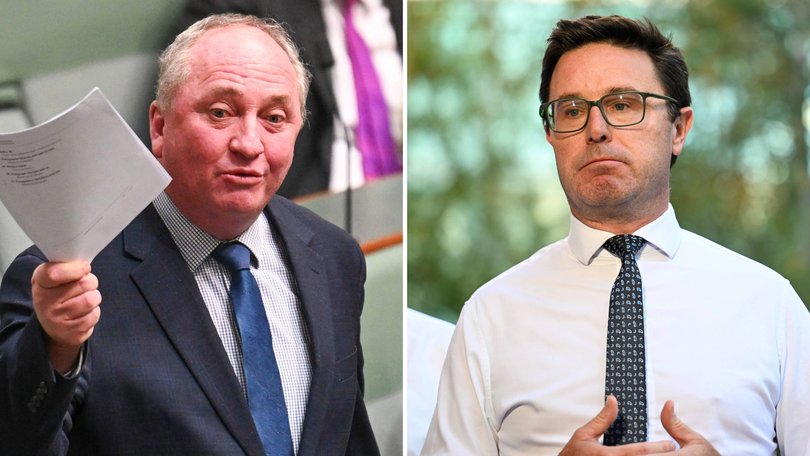EDITORIAL: Labor to blame for re-emergence of climate wars
EDITORIAL: Labor’s lack of transparency on key questions relating to the net-zero target has allowed suspicion and resentment to fester in some corners.

Another Parliament, another leader of a Coalition party whose job is at risk over energy policy.
This time, the debate over whether to dump Australia’s 2050 net zero target is being used as a proxy battle over David Littleproud’s leadership of the Nationals.
Barnaby Joyce is leading the charge, along with a number of other stirrers, including his fellow former Nationals leader in Michael McCormack. Mr Joyce on Monday introduced a private member’s Bill to repeal the 2050 target — despite the fact that the Nationals and Liberals are both still reviewing their policies in the wake of May’s electoral shellacking.
Sign up to The Nightly's newsletters.
Get the first look at the digital newspaper, curated daily stories and breaking headlines delivered to your inbox.
By continuing you agree to our Terms and Privacy Policy.The Government can hardly believe its luck in all this.
They are more than content to get out of the way and give the spotlight to the Nationals as they rip themselves apart at the seams on an issue that the rest of the country has long moved on from.
Australians overwhelmingly support the need for sensible action on climate.
Australians are committed to a clean energy future. But they don’t want to be taken for a ride.
Few voices in the mainstream argue against a 2050 net-zero target. Why would they? It’s a quarter of a century away, and technology is improving rapidly.
Australia’s biggest miners are committed to an industry net zero ambition by 2050, while the National Farmers Federation supports an economy-wide aspiration by that date (though with a handful of caveats).
So, with broad support across both the voter base and the economy, how has the issue managed to hijack the national conversation yet again?
Mr Joyce can’t take all the blame.
In large part, it’s the fault of the Labor Government.
Its lack of transparency on key questions relating to the net-zero target has allowed suspicion and resentment to fester in some corners.
Take the nascent green hydrogen industry, which had been touted as a key plank of Australia’s energy transition.
Unfortunately, those lofty ambitions and the associated market hype have crumbled up against the cold, hard commercial realities.
Andrew Forrest’s Fortescue has killed off plans to build plants in Arizona and Gladstone, and BP has pulled the plug on its involvement in the $55 billion Australian Renewable Energy Hub that had been planned for the Pilbara.
Fortescue’s Gladstone facility had been the recipient of taxpayer funding — money which the company has not yet committed to repaying. Despite the flop, the Government is forging ahead with huge financial commitments towards more green hydrogen projects.
Australians are committed to a clean energy future. But they don’t want to be taken for a ride.
If there’s one positive for the Coalition in this, it’s that at least this unedifying spectacle is unfolding now, with plenty of time to run before an election.
By the time the Coalition is in a position to seriously challenge Labor, this should be a distant memory in voters’ minds.
And the Nationals are entitled to work out their own policy positions, no matter how stupid.
But seeding uncertainty about Australia’s energy transition does come at a cost.
Industry and voters need to be able to have confidence in the nation’s energy future, and that is a challenge for the mob in charge.
